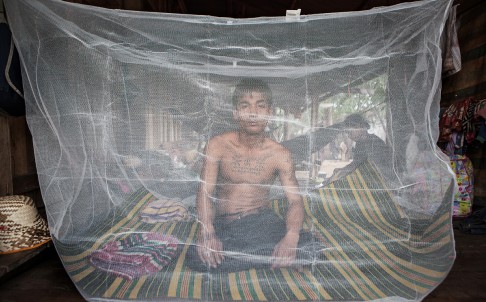Drug-resistant malaria parasites in SE Asia threaten fight against disease
PUBLISHED : Friday, 01 August, 2014, 12:36am
UPDATED : Friday, 01 August, 2014, 12:36am
Agence France-Presse in Paris

A villager sits beneath a mosquito net in a village in Pailin, Cambodia. When used properly, insecticide-treated bed nets can reduce the chance of malarial infection in malaria endemic hot-zones. Photo: SCMP
Drug-resistant malaria parasites are now firmly established in border regions in four Southeast Asian countries, imperilling global efforts to control the disease, experts warned.
Blood samples taken from 1,241 malaria patients found that parasites which are resistant to the frontline drug artemisinin have spread to border areas in western and northern Cambodia, eastern Myanmar, Thailand and Vietnam, they said on Wednesday.
There are also signs of emerging resistance in central Myanmar, southern Laos and northeastern Cambodia, but none in three African states - Kenya, Nigeria and Democratic Republic of Congo (DRC) - that were included in the sampling.
The study, published in the New England Journal of Medicine, said doubling the course of antimalarial treatment, from three days to six, could help fight the resistance problem.
"It may still be possible to prevent the spread of artemisinin-resistant malaria parasites across Asia and then to Africa by eliminating them, but that window of opportunity is closing fast," said Nicholas White, a professor of tropical medicine at Oxford University, England.
"Conventional malaria control approaches won't be enough - we will need to take more radical action and make this a global public health priority, without delay."
Southeast Asia has been the source of growing worries that artemisinin is losing its edge.
If so, it will be the third time in little more than half a century that a drug will have been blunted by parasites that became resistant to it - a process that has claimed millions of lives.
From the 1950s to the 1970s, parasites that were resistant to the drug chloroquine spread from Asia to Africa.
Chloroquine was then replaced by sulphadoxine-pyrimethamine (SP), resistance to which emerged in western Cambodia and then spread to Africa.
SP was followed by artemisinin, a drug derived by Chinese scientists from a herb called sweet wormwood.
